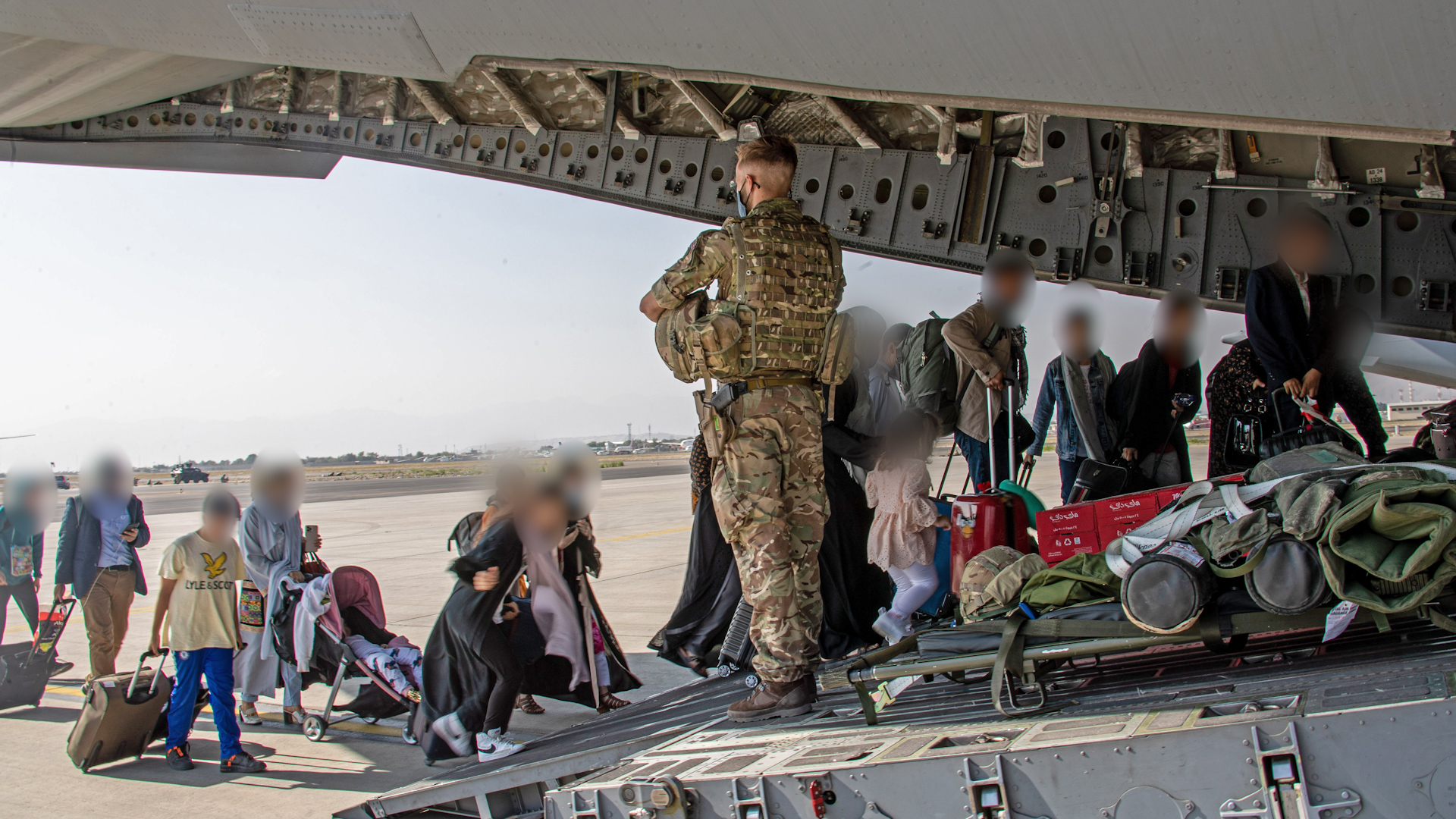Afghan resettlement schemes are too slow, says cross-party human rights group
A cross-party law reform and human rights organisation has criticised what it says are "significant delays, a lack of transparency and a lack of consistency" in the Government's policy to relocate Afghan staff who supported British Armed Forces in Afghanistan.
The schemes have been branded too slow and there are suggestions people desperately fleeing the Taliban have felt forced to make dangerous crossings across the English Channel instead, with new figures revealing that Afghans have been the most common nationality to arrive on small boats in the first half of this year, according to the latest provisional data from the Home Office.
Six people died and at least 58 – many of them Afghans – were rescued after a boat got into difficulty in the Channel off the coast of France on Saturday.
- Did Johnny Mercer just call 'eyebrows' over Veterans ID cards?
- Mercer declares 'real progress' in Veteran ID cards rollout… and says he's confident of saving his eyebrows
- Armed Forces personnel use food banks due to 'personal budgeting decisions', Mercer says
In a report, the Justice charity called for a series of improvements to the Afghan Relocations and Assistance Policy (ARAP) and Afghan Citizens Resettlement Scheme (ACRS) which were set up to allow Afghans to resettle in the UK as they feared persecution after the Taliban retook control of the country in 2021.
The Justice organisation urged quicker processing times, clarity in how the schemes work, and better communication with applicants among other concerns raised in its report.
The report said: "The Afghan Citizens Resettlement Scheme (ACRS) and the Afghan Relocations and Assistance Policy (ARAP) were both designed to help Afghan citizens whose lives are now at risk due to having worked in support of the UK during its presence in Afghanistan.
"Yet, Justice found that neither scheme is working as it should.
"Despite promises to help Afghans relocate, there remain significant delays, lack of transparency, and lack of consistency to Government decision-making.
"This has resulted in a lack of clarity about how the schemes operate, a convoluted application process with significant implications for the subsequent relocation. This includes the need to travel to third countries, such as Pakistan, for biometrics and visas, which often incurs significant risk to the lives of applicants."
Justice said that the Government had so far received 141,000 applications for ARAP but just over 12,300 individuals had arrived in the UK.
It added that there are about 2,417 eligible individuals and their families still in third countries yet to be relocated.
Justice launched the report, Reforming the Afghanistan Resettlement Schemes: the way forward for ARAP and ACRS, on the two-year anniversary of the fall of Kabul and the Taliban takeover of Afghanistan, marking the end of British operations in the country.
Meanwhile, the Minister for Veterans' Affairs said he was determined to make resettlement schemes for Afghans in the UK "work properly".
Former Army officer Johnny Mercer, who served in Afghanistan during his time in the military, acknowledged some people had been left behind after the Taliban takeover in August 2021 and still have not been brought to safety two years on.
Speaking on the anniversary of the start of Op Pitting – the largest evacuation effort Britain has been involved in since the Second World War – he said the UK should be "proud" of the efforts to rescue and resettle people in the wake of the chaotic withdrawal of Western forces from the country.
But, in the face of criticism from charities and humanitarian organisations that resettlement schemes are not working well, and that some refugees who have been brought to the UK have spent their time in hotels, he also acknowledged that things could have been done differently.

Last month, Armed Forces minister James Heappey confirmed that while more than 141,000 applications had been made to ARAP – which was launched in April 2021 for those Afghans who worked for or with the UK Government in Afghanistan – around 12,200 eligible individuals and their family members had been brought to safety in the UK under the scheme.
The ACRS, which is split into three pathways, had seen just 54 people resettled by March this year under the two options which cover vulnerable refugees referred by the United Nations High Commissioner for Refugees (UNHCR) and those who supported the UK and international community efforts or are particularly vulnerable, such as women and girls.
Its other pathway, focused on those who arrived in the UK under the evacuation programme, saw 9,059 people resettled up to March.
Fresh figures on the numbers resettled under the schemes are expected later this month.
Mr Mercer said: "I accept that there are people in Afghanistan at the moment that we have a duty to who are not in the UK, who I want to see in the UK."
He went on to say he is "determined" to make the resettlement schemes "work properly", accepting "the challenges with both those schemes", but added that they come under the Home Office and his remit is to focus on those who have already been brought to the UK and ensuring they are moved from hotels into communities.
He said he is "very clear, from a personal perspective, as to what we owe these people" and insisted he is "determined that this Government will get it right when it comes to what we owe these people".
Asked if the Government had got it right to date, the former Army captain said: "Clearly, hotels are not long-term accommodation options for Afghans and their families. I mean, some of them have had a very, very difficult experience. I recognise that. I've visited a lot of them myself.
"It was never the intention (for them to stay in hotels). The reality is that we've had to deal with the situation as we found it.
"There's been a longstanding challenge around housing in this country and that's collided with the reality of a very quick collapse in Afghanistan. And we've ended up where we've ended up, with Afghan families in hotels for far too long. So, look, things could always have been done differently."
The Local Government Association said earlier this month that as many as a fifth of Afghan refugees in some parts of England who have been evicted from hotel accommodation had presented to councils as homeless, therefore needing temporary accommodation.
Mr Mercer said the deadline for people to leave hotels by the end of August had been "a controversial move" but said it was done "with compassion in mind and I think it's proved its worth".
He said 440 Afghans had been matched to homes in the past week "and I couldn't have generated that momentum without putting that hard deadline in there".
Meanwhile, the International Rescue Committee has branded the ACRS "too slow" and criticised the Government's 20,000 cap on numbers, saying it is "leaving thousands of people who supported the allied efforts, or have connections to the UK, trapped in the country or neighbouring states".
The Afghanistan and Central Asian Association, which has been working with Afghan refugees, said "the two schemes have resettled only a limited number of individuals in the UK".
Its founder, Dr Nooralhaq Nasimi, said: "Consequently, numerous at-risk Afghans, including those who previously collaborated with British authorities in Kabul, lack a secure path to the UK. This situation has driven many to resort to dangerous Channel crossings in small boats."
The Government acknowledged there remains a way to go to bring all those eligible under ARAP to safety in the UK but said it is working to consider applications as quickly as possible.
A Home Office spokesperson said: "We made one of the largest commitments of any country to support Afghanistan, and so far we have brought around 24,600 individuals to safety to the UK, including thousands under our Afghan resettlement schemes.
"There is no need for Afghans to risk their lives by taking dangerous and illegal journeys.
"Between 2015 and 2022, we have offered a place to over half a million people seeking safety through our safe and legal humanitarian routes.
"Those in need of protection should claim asylum in the first safe country they reach, which is often close to the region or in a neighbouring country."









